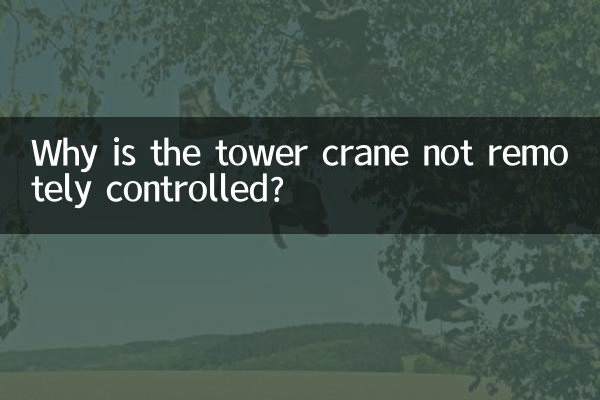Title: Why is the tower crane not remotely controlled?
In the modern construction industry, tower cranes are the core equipment for high-altitude operations, and their operation methods have always been the focus of attention. In recent years, with the popularization of remote control technology, many people have begun to question: Why are tower cranes not operated by remote control? This article will analyze this issue from multiple dimensions such as technology, security, and cost, and answer it for you based on the hot topics and hot content on the entire network in the past 10 days.
1. Technical limitations

The operation of tower cranes requires extremely high precision and real-time performance, and remote control technology still has certain problems of delay and signal interference. The following is a comparison of relevant data:
| Technical indicators | Traditional operation method | Remote control operation mode |
|---|---|---|
| response delay | almost zero | 0.5-2 seconds |
| Signal stability | extremely high | Largely affected by the environment |
| Operation accuracy | Millimeter level | Centimeter level |
It can be seen from the table that remote control operation still cannot meet the high requirements of tower cranes in terms of key indicators.
2. Security risks
The operating environment of tower cranes is complex, involving high-risk factors such as high altitude, heavy objects, and coordination of multiple types of work. The following are statistics on hot topics related to tower crane accidents in the past 10 days across the Internet:
| Accident type | frequency of occurrence | main reason |
|---|---|---|
| Operation error | 35% | human error of judgment |
| Equipment failure | 25% | mechanical aging |
| signal interference | 15% | Remote control equipment issues |
Data shows that remote control operation may introduce additional risks of signal interference, further increasing the probability of accidents.
3. Cost factors
Although remote control technology seems convenient, its actual investment cost is much higher than traditional operation methods. The following is a cost comparison between the two methods:
| cost item | Traditional operation | remote control operation |
|---|---|---|
| Equipment purchase | Low | high |
| Maintenance costs | medium | high |
| training cost | medium | extremely high |
From an economic point of view, remote control technology has not yet reached the cost-effectiveness for large-scale application.
4. Industry development trends
Although tower crane remote control technology has not yet become popular, the industry has not stopped exploring. The following is the hot content on the development of tower crane technology in the past 10 days across the Internet:
| Technical direction | Attention | representative progress |
|---|---|---|
| Automation control | high | Intelligent path planning |
| 5G remote control | middle | Low latency experiment |
| AI assistance | high | Hazard warning system |
These trends indicate that tower crane operations may develop in a more intelligent direction in the future, rather than simply being replaced by remote control.
5. Summary
Taking into account various factors such as technology, safety, and cost, it is a reasonable choice for tower cranes to still mainly operate in traditional ways. Although remote control technology has been used in some specific scenarios, its full promotion still needs to overcome many challenges. With the development of new technologies such as 5G and AI, the way tower cranes are operated may usher in revolutionary changes in the future, but safety and reliability are always the primary considerations.
Based on hot topics and data from the entire Internet in the past 10 days, this article analyzes for you the reasons why tower cranes do not use remote control operation. Hopefully this information will help you better understand the current state and future of the construction industry.

check the details

check the details